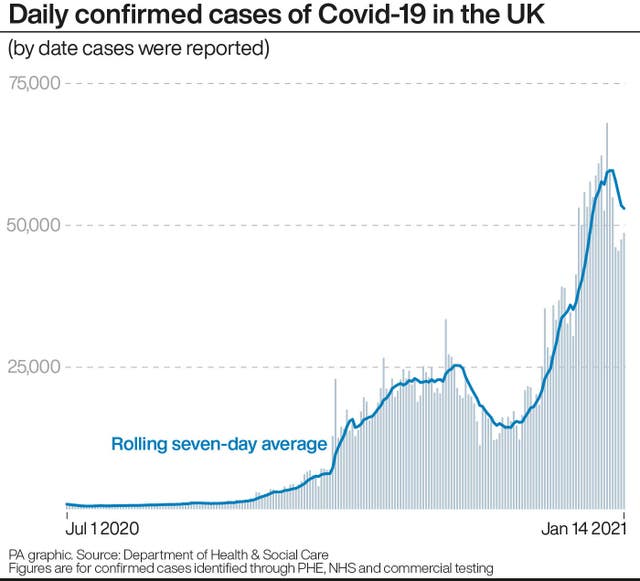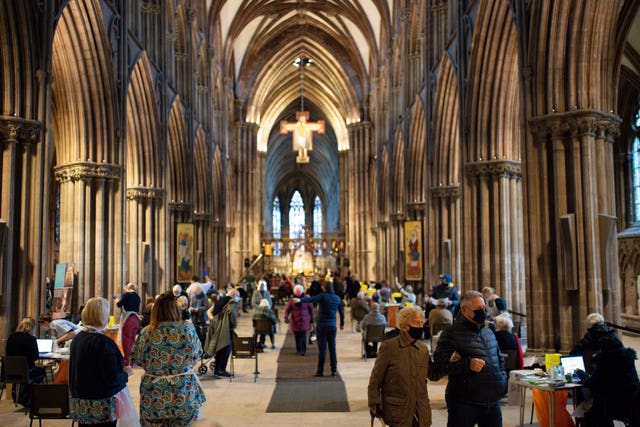One Brazilian coronavirus variant detected in UK before travel ban – virologist
Professor Wendy Barclay said the variant may have been ‘introduced some time ago’.

One of two Brazilian coronavirus variants was detected in the UK ahead of ministers banning the arrival of travellers from South America to limit the spread of a concerning new strain, a leading virologist has said.
Professor Wendy Barclay, who is advising the Government’s Covid-19 response, said the variant may have been “introduced some time ago”.
But she explained this was not the mutation of concern that had been picked up in travellers going to Japan.
Her comments came after Transport Secretary Grant Shapps said he was “not aware” of any cases of the strain that led him to impose the restrictions, which also covers Portugal due to its strong links with Brazil.
The restrictions came into force at 4am on Friday in response to concerns of a Brazilian variant that shares with the new South African strain mutations that are associated with a rapid increase in cases in areas where there have already been large outbreaks of the disease.
Prof Barclay, head of the G2P-UK National Virology Consortium, a new project set up to study the effects of emerging coronavirus mutations, said: “There are two different types of Brazilian variants and one of them has been detected and one of them has not.
“In the databases, if you search the sequences, you will see that there is some evidence for variants from around the world, and I believe including the Brazilian one, which probably was introduced some time ago.
“That will be being traced very carefully.”
She later clarified: “The new Brazilian variant of concern, that was picked up in travellers going to Japan, has not been detected in the UK.
“Other variants that may have originated from Brazil have been previously found.”
The Imperial College virologist added that both Brazilian variants – one of which was detected by travellers in Japan and the other which is more prevalent in Brazil currently – have mutations that suggest “they might impact the way that some people’s antibodies can see the virus”.
“It is really important that we carry out this work now, and carry it out carefully, and in several different laboratories, to really firm up those results because they have big implications,” she added.
Earlier, Mr Shapps described the ban, which includes an exemption for British and Irish nationals, as a “precautionary” measure to ensure the vaccination programme rolling out across the UK was not disrupted by new variants of the virus.

Asked if the Brazilian strain was currently in the country, he told BBC Radio 4’s Today programme: “Not as far as we are aware, I think, at this stage.
“There haven’t been any flights that I can see from the last week from Brazil, for example.”
Dr Mike Tildesley, an epidemiologist who advises the Government on its scientific pandemic influenza group on modelling group, said the UK was late in imposing the travel ban but that it should minimise the risk from a “more transmissible” variant.
“We always have this issue with travel bans, of course, that we’re always a little bit behind the curve,” he told BBC Breakfast.
“My understanding is that there haven’t really been any flights coming from Brazil for about the past week, so hopefully the immediate travel ban should really minimise the risk.”
Dr Tildesley said although scientists “don’t believe there is anything to worry about” in terms of vaccine efficacy, the higher transmissibility could mean “people potentially might end up developing severe symptoms more rapidly which could cause more issues with our health service”.
Shadow home secretary Nick Thomas-Symonds said the ban, which includes an exemption for hauliers travelling from Portugal to allow the transport of essential goods, was a “necessary step” but accused ministers of incompetence and “lurching from one crisis and rushed announcement to another”.
Mr Shapps was also forced to defend the delay in requiring negative tests from travellers before they head to the UK from Friday until Monday as a “small grace period” needed to prevent a “repatriation crisis”.
There were tentative signs the national lockdown was bringing infection rates under control in some parts of England.
Cambridge University researchers said the reproduction rate of the virus – known as R – is below 1 in the East of England, London, the South East, West Midlands and Yorkshire and the Humber, meaning the number of cases should be shrinking.
However, they believe it is still above 1 in the South West, North West, North East and East Midlands, indicating case numbers could still grow in those regions.
Meanwhile, the latest figures showed the number of people across the UK to have received the first dose of a Covid-19 vaccine has passed 2.9 million.

Public Health England (PHE) also released data showing infection rates had fallen in most regions of England across all age groups apart from the over-80s, in a further sign that lockdown measures are having an impact.
At the same time, however, the PHE surveillance report noted there were more people being admitted to hospitals and intensive care units.
NHS England said around one in five major hospital trusts in England had no spare adult critical care beds on January 10.
The time lag between a fall in cases and an impact on the death toll means grim figures are likely to remain a factor for some time.
The latest official figures showed a further 1,248 people had died within 28 days of testing positive for Covid-19 in the UK as of Thursday.





